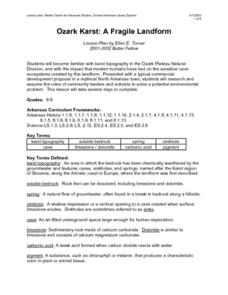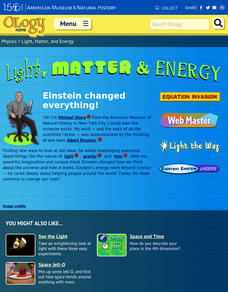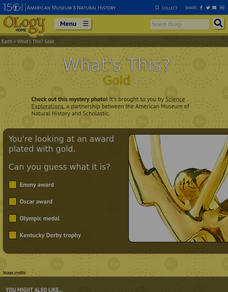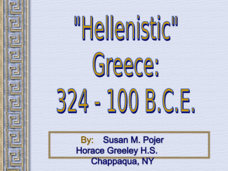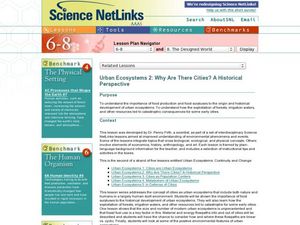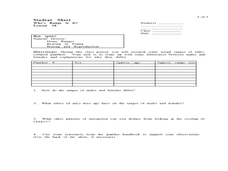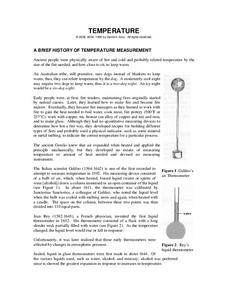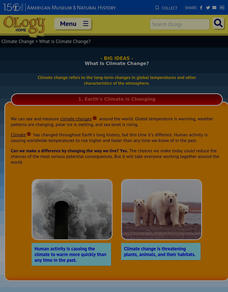Curated OER
Ozark Karst: A Fragile Landform
Young geologists become familiar with the Karst Topography in the Ozark Mountains. They study how human activity has affected the cave ecosystem. They conduct a simulation in which a large development is proposed in the area, and they...
Curated OER
Arkansas State Mineral: Quartz Mineral
The quartz crystals found in the mountains of Arkansas are among the purest and clearest in the world! This instructional activity has middle schoolers focus on this state mineral of Arkansas as they study the state's geography. A fun...
Teach Engineering
Computer Simulation of the Sonoran Desert Community
See how changes in initial populations and parameters affect a biological community. Individuals use a special software program to simulate a desert community with five species. They adjust initial populations to see how the community...
American Museum of Natural History
Light, Matter and Energy
Let Einstein's work shine the way. Pupils read about Einstein's iconic equation, E=mc^2, using a remote learning resource and see how ideas from other scientists such as Kepner, Curie, Galilei, and Newton led to its discovery. They...
American Museum of Natural History
What's This? Gold
Cell phones are likely made of gold—at least part of them! An interesting lesson explains the conventional and not-so-conventional uses of the popular element gold. From the Inca empire to modern-day technology, learners discover gold...
Curated OER
Two Rivers Ran Through It
Sixth graders discover the problems that early Mesototamian farmers faced while developing agriculture in the land between the Tigris and Euphrates Rivers. They design a working model that solves those unique challenges.
Laboratory for Atmospheric and Space Physics
Space Travel Guide
Looking to take a trip? Why not go to space? Here, scholars take on the role as travel agent to create a guide to their favorite planet including travel tips and sightseeing recommendations.
University of Colorado
Space Travel Guide
Neptune takes 164.8 Earth years to travel around the sun. In the fifth of 22 lessons, young scientists create a travel guide to a planet in our solar system. They provide tips for others on what to bring, what they see, and their...
American Museum of Natural History
What is the Greenhouse Effect?
Without the greenhouse effect, Earth would not be inhabitable. A thorough online resource describes the greenhouse effect and how it occurs. The source highlights the different types of gases that work together to absorb the sun's...
Curated OER
It's a Gas! Or is it?
Examine the effects of temperature and pressure on solubility and the states of matter of ocean water. Learners make inferences about the unique chemistry of ocean water at different depths. They engage in an activity related to...
Curated OER
Alexander the Great and Hellenistic Greece
Visual images, maps, and notes on the great philosophers and scientists of Hellenistic Greece await your class. While light in terms of text, the presentation provides images that should help you to describe the area and reign of...
Messenger Education
Snow Goggles and Limiting Sunlight
Why would someone need contact lenses that offer UV protection? With a 28-page packet full of instruction and worksheets, young scholars discuss solar radiation and its potential harm to eyes. They make snow goggles...
Curated OER
Urban Ecosystems 2: Why Are There Cities? A Historical Perspective
Young scholars investigate the importance of food surpluses to the historical development of urban ecosystems.
Curated OER
It's a Gas! Or is it?
Oceanography enthusiasts are given a series of thought experiments to consider in order to relate the solubility of gases and solids to underwater volcanoes. It is not particularly engaging to perform these thought experiments. Choose...
Curated OER
Hummingbirds and Flowers: A Study of Co-Adaptive Relationships
Hummingbirds and flowers need each other to survive! Pupils explore the co-adaptation of hummingbirds and the flowering plants. They explain how a flowering plant has adapted to be pollinated by a hummingbird and how the hummingbird has...
Curated OER
Who's Range is it?
Students investigate the habits of panthers by analyzing radio transmitted data. In this animal life lesson, students utilize computers to view the range of different statistics dealing with Florida panthers. Students...
Curated OER
Dining Out With Fishes and Birds of the Hudson
The class will make observations to determine how environment has shaped the way particular birds and fish eat. They will view a series of photographs, read two short articles, and then consider how food availability has determined how...
Merck KGaA (Darmstadt, Germany)
EMD PTE
You can't tell by the title, but this is a functional periodic table of elements. Incorporating bright colors, lucid text, and easily operated features, this application serves as a valuable reference tool for your chemistry class.
Curated OER
Volcanoes and People
Students discover that volcanic eruptions are geologic events that take place within the upper part and on the surface of the Earth's lithosphere. They explain how volcanoes are related to the Earth's lithosphere. They focus on the May...
Chymist
Temperature
Three Dog Night isn't just the name of a band; it is also the way an Australian tribe, who used dogs to stay warm, would describe the temperature on a cool evening. After reading about many different ways of measuring temperature, the...
American Museum of Natural History
What Is Climate Change?
So many factors show that climate change has arrived. Learners read through an online resource that explains the data and the consequences of climate change. They also review strategies for slowing or even reversing the global influence.
American Museum of Natural History
The Amazing Mundo
Rocks and minerals are great on their own, but they also turn into some pretty amazing stuff! An online lesson explains the different types of materials we get from rocks and minerals, including glass, plastic, and coins. An embedded...
Curated OER
Animal and Plant Cell Journaling Activity
Jump into the classification of animal and plants cells, through this inviting lesson comparing Elodea leaves and Epithelial cells. Middle school learners will create wet mounts, write journal entries that compare specimens, and finally...
Curated OER
Arkansas: A Changing Climate, a Changing Land
Here is a instructional activity on the climate zones and geography of Arkansas. In it, learners look at maps (embedded) of different climate zones found throughout Arkansas. They engage in discussions regarding how global warming and...


